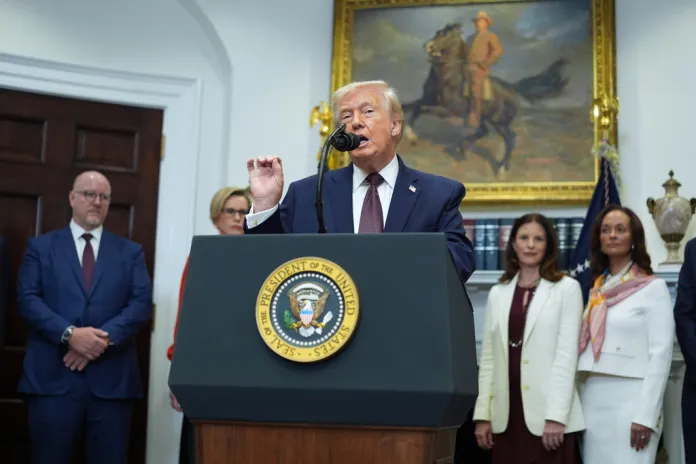The Best Way For Trump To Stick It To WHO Is To Stick With It
President-elect trump has threatened to withdraw the United States from the World Health Association (WHO), a move that coudl forfeit U.S. influence and opportunities for reform. Recently, the WHO has faced criticism for its handling of the COVID-19 pandemic, including alleged collusion with China regarding the virus’s origins and the promotion of ineffective lockdown measures. The organization has been accused of exacerbating global inequality and public health issues through its policies,notably in its COVAX vaccination campaign aimed at populations that already had immunity. Critics question the value of WHO amidst these failures and suggest that defunding could prompt organizational reform. Though,other entities,such as the Bill and Melinda Gates Foundation and the European Union,may easily fill the financial void left by the United States,potentially perpetuating existing agendas.
President-elect Trump has threatened to pull out of the World Health Organization (WHO). But a rapid exit would cede influence and miss an opportunity to fundamentally reform the agency.
WHO has gained attention in recent years for all the wrong reasons. As the U.S. Congress “After Action Review of the COVID-19 Pandemic” recently concluded, the organization colluded with China and those behind the gain-of-function research that probably spawned Covid-19 to hide its origins. It then promoted seriously flawed lockdown policies contrary to its own guidelines. These policies will increase global inequality and ill-health for generations. It ran the $12 billion COVAX mass vaccination campaign, targeting young African and Asian populations it knew were already immune and carried little risk of severe disease.
Rather than reflect on these failures, WHO is now consistently misleading countries on the risk of future naturally occurring pandemics. So why not just dump this organization?
As WHO’s largest funder, the United States provides about 15 percent of WHO’s annual budget of nearly $4 billion. Defunding could give WHO pause for thought. However, plenty of others can step in. The Bill and Melinda Gates Foundation, the second largest funder after the U.S. and a chief proponent of the disastrous Covid pandemic policies, has strong incentive and capacity to fill the gap. So does Germany with its large pharma sector invested in mRNA vaccines. So could the European Union and several other funders looking to counter Trump’s lack of enthusiasm for global institutions.
The money involved is a fraction of what some of these actors send to Ukraine or have pledged to other pandemic-agenda investments. In this case, WHO would continue, with the U.S. simply losing influence.
In four years’ time, the United States will have a new president. He or she may be a Democrat and want to rejoin the WHO for no reason other than to reverse Republican policy. The U.S. will likely then rejoin and re-fund an organization even more beholden to corrupting private and geopolitical interests than it is today.
The rest of the pandemic industrial complex will also be left in place: the big public-private partnerships like Gavi and CEPI, the health arm of the World Bank, and the entire complex of investment houses and multinational corporations gorging themselves at the pandemic trough. Having found ways to lock in profits by making America sick, the global public health is ripe for pillage.
The wealth concentration during Covid would have looked much the same had WHO not been there, a fact that is critical to understanding WHO’s role. When those whose research and outputs have made people sick, the companies who manufacture drugs and vaccines to address these illnesses, and government agencies intended to police them all speak with one voice, they don’t need WHO to get their message across. WHO was the useful tool they fund it to be, but not an essential one and not the root of the problem.
But WHO is the only entity among the big global health agencies that is constitutionally governed by countries alone. While corrupted by vested interests and the inevitable rot that afflicts large, poorly accountable bureaucracies, a deeply reformed WHO would be an opportunity we would be foolish to lose.
WHO would need to be a fraction of its current size, concentrated on what it can do well, and free from private influence. It can go back to shaping the coordination standards for the management of diseases like tuberculosis and malaria and exposing the deadly criminal industry of fake drugs in low-income countries. Focused on building technical capacity within countries that request such help, it could remove the need for such aid (and therefore WHO itself) in years to come.
It was the current U.S. administration that imitated and promoted the pandemic power-grab through reforms to the International Health Regulations and the proposed pandemic treaty. This same influence can improve health and expand freedoms, effectively fighting tyranny with soft power. WHO is uniquely structured to do this, rolling back the self-serving overreach of the ever-expanding global health industry.
WHO may prove unreformable. It is big, ossified, corrupted, and staffed with people living comfortable lives and dedicated to expanding it further. But this is much like the federal bureaucracy that the incoming U.S. administration plans to reform.
If reform proves impossible, then WHO should be replaced with something fit for purpose, fully accountable to member states, and designed with a use-by date. In attempting reform, alliances will build. Whether it’s WHO or a replacement, we can then have an organization designed to serve countries and their populations, not profit — an organization in which the reforms made in this term will stick.
David Bell is a public health physician and former scientist and medical officer at the World Health Organization.
" Conservative News Daily does not always share or support the views and opinions expressed here; they are just those of the writer."




